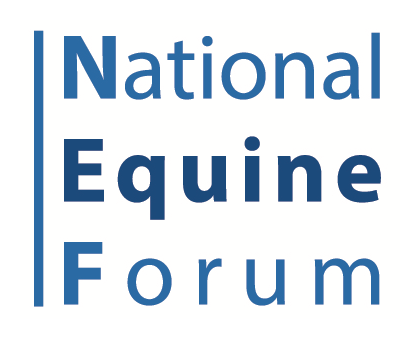The latest knowledge and know how on horse and rider fitness and equine stereotypical behaviours was enthusiastically received by a packed audience at the National Equine Forum afternoon session on 7th March 2019. More than 1200 people around the world also watched the event via live stream. The highly educational content attracted 14 students and lecturers from four UK equestrian colleges.
Field-leading scientific, veterinary and educational experts shared their knowledge of fitness and its direct bearing on performance, across the equestrian disciplines. The three-part practical and educational session commenced with Dr David Marlin presenting an overview of cardiovascular fitness, the background to cardiovascular fitness training and how it can be applied to different equestrian disciplines. He stated that we have a moral responsibility to make sure the horse is fit enough to do the job that is required of it. “We don’t necessarily have a problem getting horses fit, but it is clear that the training methods we use generate a high level of injury, so we need to focus on this area to reduce lameness.”
Dr Rachel Murray, Senior Orthopaedic Advisor at the Animal Health Trust followed up by explaining what cardiovascular fitness means in reality, focusing on core stability and muscle development of the horse. She explained that when the horse does not have a strong core, he will compensate through the body to cope with the work that he is being asked to do, which compromises his soundness. Consistent and regular stable exercises, groundwork and ridden exercises are the route to developing a strong core bit it is important that the work is always tailored to the specific horse and done slowly to build strength.
Ashleigh Wallace, Human Sports Science Physiotherapist and Medicine Lead, of the World Class Programme at the British Equestrian Federation rounded off the fitness session with a look at the rider, and how an asymmetry can impact on the horse, whether an elite athlete or a grassroots rider. She reminded the audience that the most dangerous phrase in the language is “we’ve always done it this way”.
A better understanding of equine behaviour can undoubtedly support management practices to enhance both welfare and performance. Dr Andrew Hemmings, Head of the School of Equine Management and Science at the Royal Agricultural University gave a fascinating insight into Equine Stereotypic Behaviour. He explained feeding in relation to brain function and crib biting and the learning difference in horses that perform weaving and crib-biting and associated training implications. He concluded that reducing palatable concentrate feeds will reduce crib-biting, that crib-biters and weavers learn simple tasks quickly and that with crib-biters, unlearning will be difficult.
Bringing aspects of the UK’s equestrian sector into sharp perspective Claire Williams Executive Director and Secretary of the British Equestrian Trade Association presented the initial findings of the BETA National Equestrian Survey 2019. She delivered optimistic news that the figures showed a stabilising of the riding population, and a tentative recovery from the decline of 2014. A total of 1.8% of the population are riding once a month up from 1.3% in 2014. The full results of the survey will be published in May.
Dr Simon Curtis, a practicing farrier in Newmarket, Suffolk, who won the 2018 Sir Colin Spedding Award, was invited to give this year’s Memorial Lecture and enlightened the audience on fascinating advances in farriery during his career. He explained that for the future “we need apprenticeships, monitored by a master farrier. We need more research and science to guide our methods so farriers continue to help horses’ welfare and performance.”
HRH The Princess Royal summarised the day and announced the winner of Sir Colin Spedding Award as Gordon Wesley in recognition of his longstanding dedication to many aspects of the equine sector, both at home and abroad. Unfortunately Gordon was not well enough to attend the Forum so the Award was presented to his daughter Boo Powe on his behalf.
The afternoon session was preceded by a lively morning of discussion and debate on Brexit and what it means for the horse industry in practical terms; How to make the most of the Central Equine Database; Learnings from the Equine Influenza outbreak; The latest thoroughbred welfare racing initiatives and a panel discussion on Charities in the modern world, chaired by HRH The Princess Royal. More details available here.
The day’s proceedings will be available to view soon on our You Tube Channel.
The 28th National Equine Forum will be held on Thursday 5th March 2020.
Picture: Dr David Marlin giving his presentation “General principles of exercise, training and fitness in horses”.
Picture courtesy of Craig Payne Photography

